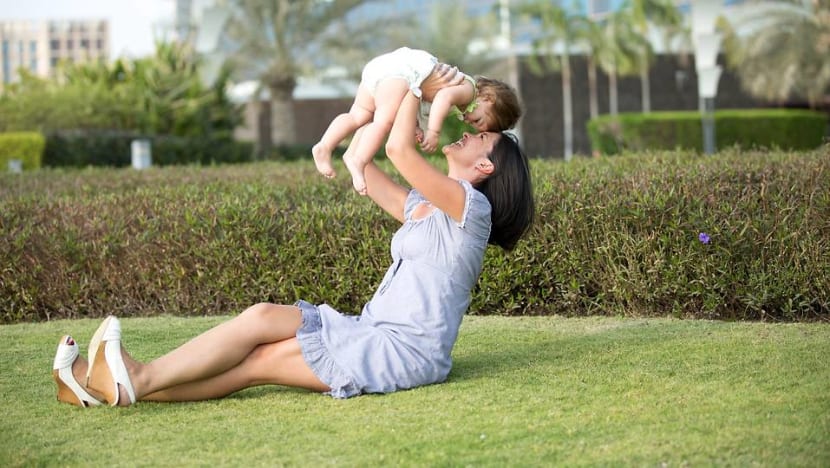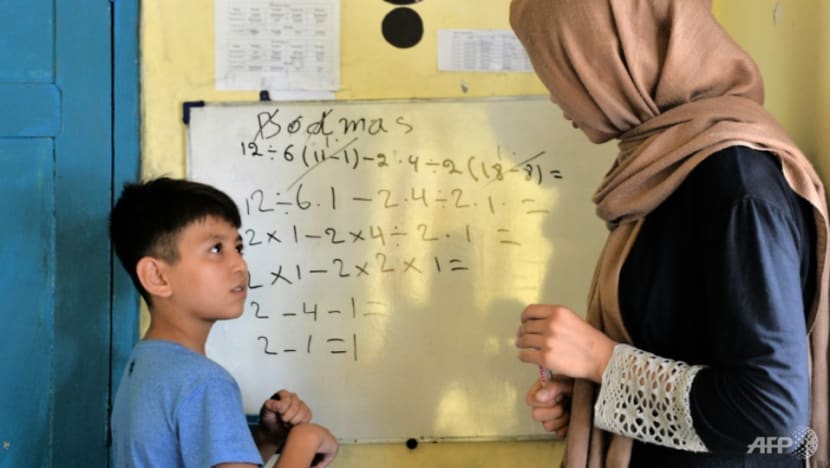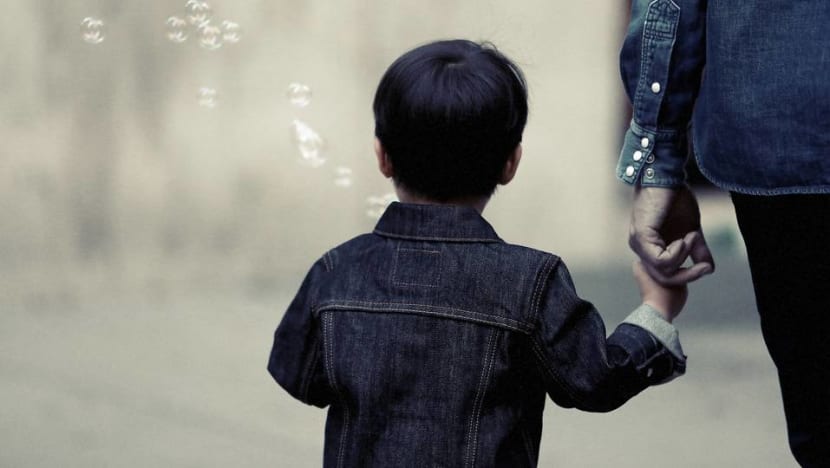commentary Commentary
Commentary: Let’s move away from caning and corporal punishment for our kids
The common view that corporal punishment is an effective way to correct a child's misbehaviour is misguided, says Professor Ho Lai Yun.

Smacking children is outlawed in at least 54 countries. (File photo: AFP)
SINGAPORE: Recently, news about a three year-old boy who was excessively caned by his father again cast a spotlight on disciplinary practices in Singapore. The father was subsequently charged of ill-treating a child by causing him unnecessary physical pain.
Parents who use corporal punishment rarely set out with the intention to injure their children. However, a handful inadvertently cross the line when they are unable to control their emotions and actions.
Last year, the Ministry of Social and Family Development investigated 660 cases of physical abuse in Singapore, which accounts for 60 per cent of all child abuse investigations.
In a study done by the KK Women’s and Children’s Hospital, the hospital’s emergency room diagnosed 1,971 cases of non-accidental injury in children between 2011 and 2016.
READ: Commentary: From COVID-19 to parenthood, judging each other is back with a vengeance
READ: When caning of children becomes abuse: Lawyers explain the legal parameters
The mean age of these child patients was around 7.7 years old, and the top two types of injury were bruises at 55 per cent and cane marks at 21 per cent.
Let us understand parents’ perspectives in using corporal punishment, and look at research studies that examine its effectiveness and impact on children.
AN ACCEPTABLE FORM OF DISCIPLINE?
The American Academy of Pediatrics defines corporal punishment as the “non-injurious, open handed hitting with the intention of modifying child behaviour”. In our context, objects such as canes and hangers are often used too.
Corporal punishment largely remains acceptable here. It is common to hear claims like, “My parents spanked me, and I turned out okay”. Euphemisms like “a loving smack” further lend legitimacy and even a sense of responsibility that parents have towards their wards from a tender age.
READ: Commentary: Perhaps now, stay-home mums will get the credit they deserve
READ: Commentary: COVID-19 is giving dads more opportunities to be involved at home
Another common view is that corporal punishment is an effective way to correct a child's misbehaviour if used judiciously. It can elicit immediate compliance, get a child’s attention and assert parental authority.

Understandably, the issue of corporal punishment is deeply personal and provoking as carers may take it as an affront on their parenting style.
But today, research into the impact and harm of corporal punishment on child development, studies on child psychology and behaviour, as well as greater familiarity with positive parenting and effective discipline strategies have evolved.
EFFECTIVENESS AND IMPACT OF CORPORAL PUNISHMENT
Some of the most compelling evidence that has emerged in recent times have called the effectiveness of corporal punishment into question.
Studies on the immediate compliance after corporal punishment suggest that while it could deter children from misbehaving in the moment, it does not guarantee that appropriate behaviour will take its place or that misbehaviour will decline. Corporal punishment alone does not teach children what to do in place of the problem behaviour.
In fact, the problem behaviour might return, even if the parent escalates the frequency and intensity of punishment, and this might then cross into physical abuse.
READ: Commentary: A little baby talk is good for your toddler
In a telephone survey with close to 1,500 mothers in the United States, mothers who reported that their child was spanked were three times more likely to also report using harsh punishment that could constitute physical abuse, such as kicking and burning or scalding their child.
Importantly, mothers who reported that their child was spanked with an object were nine times more likely to also report having used harsh punishment on their child.
In addition, findings have consistently shown that corporal punishment does not promote the development of pro-social behaviours.
Conversely, it has been linked with more aggressive and anti-social behaviours. Some argue that by using corporal punishment, parents model aggressive behaviour and studies have shown that children develop attitudes about the acceptability of violence partly from how they are treated by their parents and what they see around them.
We are also beginning to understand the long-term impact of corporal punishment. In a study conducted in Malaysia, researchers found that individuals who reported experiencing more frequent and severe corporal punishment as children had poorer psychological adjustment in adulthood.
The scientific community has recognised the need to consider nuances across societies and cultures, with studies emerging to shed light on this practice in Asian societies. It has been found that the negative effects of corporal punishment are not confined to the West.
In international studies involving Asian populations, such as China, Thailand, and the Philippines, corporal punishment was related to increases in children's anxiety and aggression over time, even when children have a warm relationship with their mothers.

There is also the view that if corporal punishment is regarded as a normal parenting practice, like in most Asian societies, the link between corporal punishment and poor child outcomes is weaker. But research has shown that corporal punishment remains consistently associated with poorer outcomes such as aggression and anxiety.
WHAT ARE THE ALTERNATIVES TO CORPORAL PUNISHMENT?
Children are generally motivated to behave well if they enjoy a good relationship with their parents. Parents need to build up their "toolkit" of strategies to respond to children's behavioural problems, promote healthy development and build strong bonds.
READ: Commentary: Am I a bad mum for leaving my kid in childcare while returning to work?
Here are three questions to re-think your disciplinary approach:
First, what is the ratio of positive and negative experiences in your parent-child relationship? Are you reinforcing positive behaviours?
Think back on your interaction with your child over the last month. How many are positive – for example, asking how your child was and listening to his views - and how many negative, that include putting him down? Experts recommend the ratio to be around 5:1. If there are more negative interactions, you should try to tilt the balance.
Positive reinforcement for alternative behaviours such as providing rewards, specific praises and physical affection, and spending quality time are extremely effective.

In addition, children respond better to clear expectations. Beyond “stop” requests such as “Don’t shout” or “Stop crying”, follow on with “start” requests such as “Take a deep breath and speak calmly so I can understand”.
Second, when children present with difficult behaviours, what do they really need?
There are different reasons underlying children’s behaviour. When they throw temper tantrums, are they trying to get attention? Could they be avoiding something painful or are they motivated by feelings of unfairness?
Children need to be taught how to manage their feelings and impulses, how to communicate to resolve conflicts, and what to do when an action is unsafe to themselves or others. Most of the time, the immediate behaviour that children present with does not pose a high risk of danger.
READ: Commentary: Napping helps your pre-schooler learn better
There is time for parents to pause and think about what their underlying needs are before addressing their behaviours appropriately.
Third, how are you managing your child’s misbehaviour? Are your actions logical, and do they correspond with the misbehaviour?
A familiar Chinese saying goes, “harsh words and deeds can demonstrate one’s love”. While parenting is a labour of love, it does not have to hurt.
Science has not only contributed to help us understand the impact of corporal punishment on children, there is also a plethora of positive parenting strategies that have been proven to work.
As we learn to manage our children’s behaviour better through these alternative ways, we would no longer feel the need to use corporal punishment in raising our children.
Professor Ho Lai Yun is the Chairman of the Research and Advocacy Standing Committee and Vice-Chairman of the Singapore Children’s Society. The Singapore Children’s Society can be reached at info [at] childrensociety.org.sg (info[at]childrensociety[dot]org[dot]sg)














